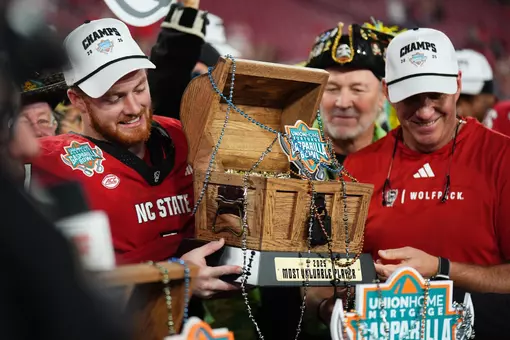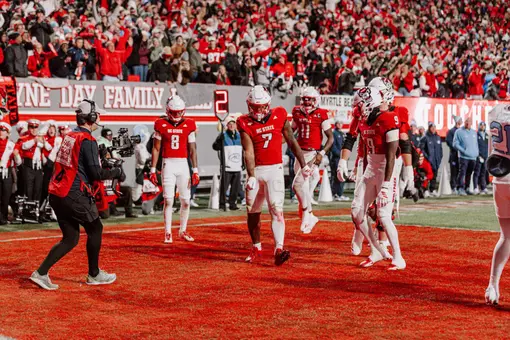North Carolina State University Athletics

SEC Network to Air Documentary on Bo Rein
9/15/2015 1:35:00 PM | Football
RALEIGH, N.C. - The third film in SEC Network and ESPN Films' SEC Storied documentary series, "The Bo You Don't Know," will premiere on Tuesday, Sept. 15, at 9 p.m. ET on SEC Network. The film looks at the story of Coach Bo Rein, who many believe would have been one of the most successful and historic college football coaches had it not been for a tragic plane accident during a recruiting trip.
Film Summary: "The Bo You Don't Know" - Directed by Brian Goodwin
When the name "Bo" is uttered in SEC circles, images of Bo Jackson's domination at Auburn quickly come to mind. But there is another Bo who is likely far less familiar to SEC followers. That would be Robert "Bo" Rein, whose pedigree could be traced to stints under Woody Hayes, Lou Holtz, and Frank Broyles. A former baseball and football standout at Ohio State, Rein was building a reputation as an innovator who inspired those around him. He became the youngest head coach in major college football when he took over at NC State at the age of 30. He brought the Wolfpack national rankings, bowl wins and an ACC title. At the end of the 1979 season, LSU hired Rein, hoping that his youthful energy could revitalize its program. But the unthinkable happened. Returning from a recruiting trip on January 10, 1980, the small plane in which he was flying crashed in the Atlantic Ocean, roughly 1,000 miles off course. That tragedy devastated his family and friends and left so many others wondering, "What might have been?"
The following is a story by Tim Peeler that recently ran in The Wolfpacker:
Where would Bo be now?
Would he be in the College Football Hall of Fame, known as one of the greatest coaches of all time?
Would he have followed in the footsteps of his mentor, Lou Holtz, to become a television analyst after a successful coaching career?
Would he have faded away to the forgotten heap of other flash-in-the-pan coaches who were unable to fulfill the early potential they showed in their difficult profession?
Tragically, we'll never know what might have become of former NC State coach Bo Rein, who died in a plane crash on Jan. 10, 1980, on a short-hop recruiting trip from Shreveport to Baton Rouge shortly after he left the Wolfpack to become the head coach at Louisiana State.
The plane soared to 40,000 feet and lost contact with air-traffic control. As it slowly cruised over Raleigh and Williamsburg, Va., where Rein had been an assistant coach at William & Mary, the plane was intercepted by the U.S. National Guard. There was no sign of life in the Cessna Conquest and the military pilots watched it crash into the Atlantic Ocean after running out of fuel.
No wreckage was ever found.
Instead of reflecting on a long and successful career on what would have been Rein's 70th birthday on July 10, Charlotte-based director Brian Goodwin put the finishing touches on his ESPN Films documentary "The Bo You Don't Know," which will air at 9 p.m. on Sept. 15 on the SEC Network. It's one of five installments in the SEC Storied series of documentaries, which are similar to ESPN's Emmy- and Peabody-winning "30-for-30" films.
Goodwin, formerly of NASCAR Productions, has spent the last two years working on ESPN projects and was fascinated by the tragic tale of Rein, who spent just 42 days as LSU's head coach after four years at NC State. He left the Wolfpack in December 1979, just weeks after leading the team to its last ACC football championship.
"We talked to a number of folks for the project who thought Bo could have been Les Miles or Nick Saban, long before those guys ever got to LSU," Goodwin says. "He was so young that theoretically, had he found the success many had expect him to at LSU, he could have been the coach there for decades, celebrating numerous SEC and national championships."
One of the film's most poignant moments takes place at the 2014 LSU Homecoming game, when the late Rein's widow, Suzanne Klang, and daughter, Linea Rein, were honored at halftime.
"It was their first time actually stepping foot in Tiger Stadium and I think it really helped us hammer home the 'what could have been' aspect," Goodwin says. "I think it also helped them both find closure, nearly 35 years later, in the warm reception they received."
The film also delves into Rein's athletic career as a three-sport legend at McKinley High School in Niles, Ohio, where the football field has been renamed Bo Rein Memorial Stadium. He was also a two-sport star at Ohio State under legendary coach Woody Hayes. As a three-year starter at halfback, Rein led the Buckeyes in receptions as a sophomore and junior and in rushing as a senior. The wiry halfback finished his career as the school's all-time leader in pass receptions.
He was also a shortstop and outfielder on back-to-back College World Series teams in 1965 and '66. The Buckeyes lost in the title game in 1965, but won the only baseball national championship in school history the following year.
Rein was drafted by the NFL's Baltimore Colts and major league baseball's Cleveland Indians in baseball, but his athletics career ended with a hamstring and knee injury while playing with the Triple-A Portland Beavers in 1968.
He quickly transitioned to coaching, spending two years under Holtz at William & Mary, one year at Purdue and three years as an NC State assistant when Holtz moved to Raleigh. Rein spent a year at Arkansas as Frank Broyles' offensive coordinator.
Following the 1975 season, when Holtz left NC State for the NFL's New York Jets, Rein returned to Raleigh to become the youngest head coach in college football at just 30 years old.
The Pack struggled to a 3-7-1 record in Rein's first season, but over the next three years, using his whirlybird option and veer offense that featured the blocking of Outland Trophy-winning center Jim Ritcher and all-time ACC leading rusher Ted Brown, the Wolfpack won 24 games, including wins over Iowa State in the Peach Bowl and Pittsburgh in the Tangerine Bowl.
The Pack qualified for postseason play with its championship in 1979 and was invited to the Garden State Bowl in New Jersey, but declined the invitation due to a conflict with the school's exam schedule.
Rein had a no-nonsense personality that was somehow infectious with his players, who he often related to as a peer. He had no problem moving players to new positions, often with them kicking and screaming, as was the case with NC State Hall of Fame center Jim Ritcher, who was dead set against moving to the offensive line from his high school position of defensive end.
There is no question he was successful, and would have continued to be so at LSU.
Much of Goodwin's film is based on Rein's time at NC State, with interviews from Holtz, Bill Cowher, Dave Buckey and Jerry Punch.
"Bo was wise in his ways," Ritcher says. "He had great insight. Had I followed my own inclination, I would have never been a center."
He knew what he wanted from each of his players and he knew how to make them successful, an intuitive quality that allowed him to put the right people at the right positions.
"The thing about Bo was that he did an excellent job of getting people to do the things they were capable of," says Darrell Moody, a former halfback for Earle Edwards who was Rein's quarterbacks and running backs coach at NC State. "If that player could do one thing well, he would find a way to put him into position to do it. You didn't have to be a complete player to be effective.
"He did a lot of changing personnel, which you didn't see a lot of back then."
Ultimately, Rein's story is a tragic tale of a bright future that was cut way too short at the age of 34.
"The potential was just unlimited," says Curtis Rein, who was a wide receiver and punt returner for three years at NC State for his older brother. "Every week, we had about 12 to 16 news plays that the other team hadn't seen. The defenses had no clue what we were going to do because we changed every week.
"It just makes you wonder what he could have done had we not lost him at such an early age."
Film Summary: "The Bo You Don't Know" - Directed by Brian Goodwin
When the name "Bo" is uttered in SEC circles, images of Bo Jackson's domination at Auburn quickly come to mind. But there is another Bo who is likely far less familiar to SEC followers. That would be Robert "Bo" Rein, whose pedigree could be traced to stints under Woody Hayes, Lou Holtz, and Frank Broyles. A former baseball and football standout at Ohio State, Rein was building a reputation as an innovator who inspired those around him. He became the youngest head coach in major college football when he took over at NC State at the age of 30. He brought the Wolfpack national rankings, bowl wins and an ACC title. At the end of the 1979 season, LSU hired Rein, hoping that his youthful energy could revitalize its program. But the unthinkable happened. Returning from a recruiting trip on January 10, 1980, the small plane in which he was flying crashed in the Atlantic Ocean, roughly 1,000 miles off course. That tragedy devastated his family and friends and left so many others wondering, "What might have been?"
The following is a story by Tim Peeler that recently ran in The Wolfpacker:
Where would Bo be now?
Would he be in the College Football Hall of Fame, known as one of the greatest coaches of all time?
Would he have followed in the footsteps of his mentor, Lou Holtz, to become a television analyst after a successful coaching career?
Would he have faded away to the forgotten heap of other flash-in-the-pan coaches who were unable to fulfill the early potential they showed in their difficult profession?
Tragically, we'll never know what might have become of former NC State coach Bo Rein, who died in a plane crash on Jan. 10, 1980, on a short-hop recruiting trip from Shreveport to Baton Rouge shortly after he left the Wolfpack to become the head coach at Louisiana State.
The plane soared to 40,000 feet and lost contact with air-traffic control. As it slowly cruised over Raleigh and Williamsburg, Va., where Rein had been an assistant coach at William & Mary, the plane was intercepted by the U.S. National Guard. There was no sign of life in the Cessna Conquest and the military pilots watched it crash into the Atlantic Ocean after running out of fuel.
No wreckage was ever found.
Instead of reflecting on a long and successful career on what would have been Rein's 70th birthday on July 10, Charlotte-based director Brian Goodwin put the finishing touches on his ESPN Films documentary "The Bo You Don't Know," which will air at 9 p.m. on Sept. 15 on the SEC Network. It's one of five installments in the SEC Storied series of documentaries, which are similar to ESPN's Emmy- and Peabody-winning "30-for-30" films.
Goodwin, formerly of NASCAR Productions, has spent the last two years working on ESPN projects and was fascinated by the tragic tale of Rein, who spent just 42 days as LSU's head coach after four years at NC State. He left the Wolfpack in December 1979, just weeks after leading the team to its last ACC football championship.
"We talked to a number of folks for the project who thought Bo could have been Les Miles or Nick Saban, long before those guys ever got to LSU," Goodwin says. "He was so young that theoretically, had he found the success many had expect him to at LSU, he could have been the coach there for decades, celebrating numerous SEC and national championships."
One of the film's most poignant moments takes place at the 2014 LSU Homecoming game, when the late Rein's widow, Suzanne Klang, and daughter, Linea Rein, were honored at halftime.
"It was their first time actually stepping foot in Tiger Stadium and I think it really helped us hammer home the 'what could have been' aspect," Goodwin says. "I think it also helped them both find closure, nearly 35 years later, in the warm reception they received."
The film also delves into Rein's athletic career as a three-sport legend at McKinley High School in Niles, Ohio, where the football field has been renamed Bo Rein Memorial Stadium. He was also a two-sport star at Ohio State under legendary coach Woody Hayes. As a three-year starter at halfback, Rein led the Buckeyes in receptions as a sophomore and junior and in rushing as a senior. The wiry halfback finished his career as the school's all-time leader in pass receptions.
He was also a shortstop and outfielder on back-to-back College World Series teams in 1965 and '66. The Buckeyes lost in the title game in 1965, but won the only baseball national championship in school history the following year.
Rein was drafted by the NFL's Baltimore Colts and major league baseball's Cleveland Indians in baseball, but his athletics career ended with a hamstring and knee injury while playing with the Triple-A Portland Beavers in 1968.
He quickly transitioned to coaching, spending two years under Holtz at William & Mary, one year at Purdue and three years as an NC State assistant when Holtz moved to Raleigh. Rein spent a year at Arkansas as Frank Broyles' offensive coordinator.
Following the 1975 season, when Holtz left NC State for the NFL's New York Jets, Rein returned to Raleigh to become the youngest head coach in college football at just 30 years old.
The Pack struggled to a 3-7-1 record in Rein's first season, but over the next three years, using his whirlybird option and veer offense that featured the blocking of Outland Trophy-winning center Jim Ritcher and all-time ACC leading rusher Ted Brown, the Wolfpack won 24 games, including wins over Iowa State in the Peach Bowl and Pittsburgh in the Tangerine Bowl.
The Pack qualified for postseason play with its championship in 1979 and was invited to the Garden State Bowl in New Jersey, but declined the invitation due to a conflict with the school's exam schedule.
Rein had a no-nonsense personality that was somehow infectious with his players, who he often related to as a peer. He had no problem moving players to new positions, often with them kicking and screaming, as was the case with NC State Hall of Fame center Jim Ritcher, who was dead set against moving to the offensive line from his high school position of defensive end.
There is no question he was successful, and would have continued to be so at LSU.
Much of Goodwin's film is based on Rein's time at NC State, with interviews from Holtz, Bill Cowher, Dave Buckey and Jerry Punch.
"Bo was wise in his ways," Ritcher says. "He had great insight. Had I followed my own inclination, I would have never been a center."
He knew what he wanted from each of his players and he knew how to make them successful, an intuitive quality that allowed him to put the right people at the right positions.
"The thing about Bo was that he did an excellent job of getting people to do the things they were capable of," says Darrell Moody, a former halfback for Earle Edwards who was Rein's quarterbacks and running backs coach at NC State. "If that player could do one thing well, he would find a way to put him into position to do it. You didn't have to be a complete player to be effective.
"He did a lot of changing personnel, which you didn't see a lot of back then."
Ultimately, Rein's story is a tragic tale of a bright future that was cut way too short at the age of 34.
"The potential was just unlimited," says Curtis Rein, who was a wide receiver and punt returner for three years at NC State for his older brother. "Every week, we had about 12 to 16 news plays that the other team hadn't seen. The defenses had no clue what we were going to do because we changed every week.
"It just makes you wonder what he could have done had we not lost him at such an early age."
Coach Doeren Signing Day Presser (Dec. 3rd)
Wednesday, December 03
FB Players Postgame Presser vs UNC
Sunday, November 30
Coach Doeren Postgame Presser vs UNC
Sunday, November 30
Coach Doeren Weekly Press Conference (Nov. 24)
Monday, November 24




